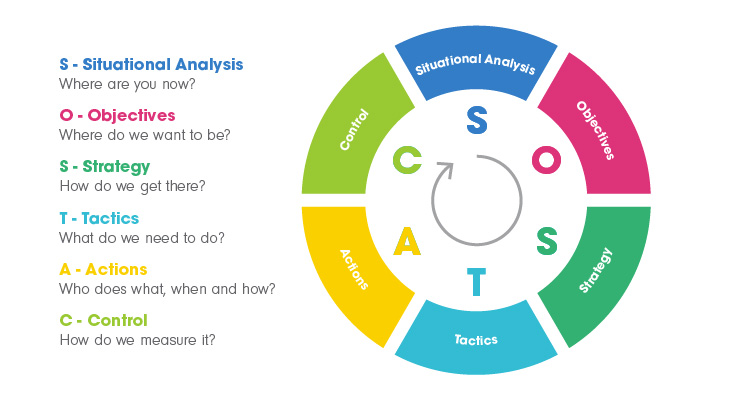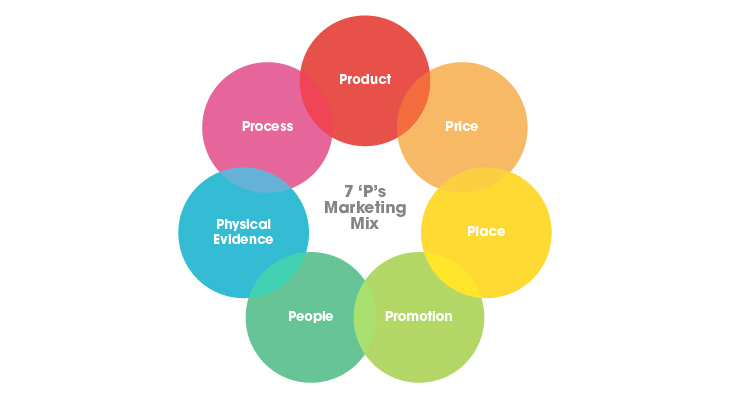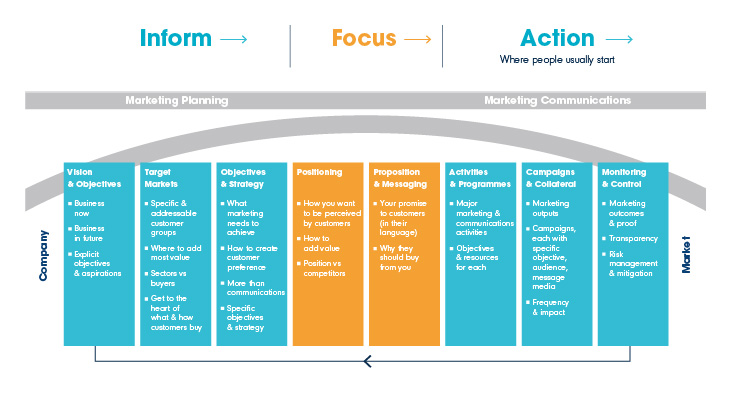Marketing Planning | 8 min. read
Why is marketing planning important?
Written by Nik Stapleton, 02.08.2022

Google ‘Marketing Planning’ and you’ll likely still be scrolling through the results at Christmas. That’s a measure of how much advice and opinion on this vital marketing function there is out there. And a mark of its importance in running a successful business.
But not everything your search turns up will be useful, still less accurate. In fact, there are so many conflicting views on what exactly marketing planning is, that it’s probably best to start by getting clarity from the leading authority.
According to the Chartered Institute of Marketing [CIM], marketing is:
‘… the management process responsible for identifying, anticipating and satisfying customer requirements profitably’.
OK, let’s unpack that a little. If marketing is a ‘management process’, then marketing planning doesn’t begin and end with the marketing department. It’s bigger than that. It’s integral to setting, managing and meeting the long-term goals of your entire business. Not just sales and brand awareness but hard and fast financial outcomes
‘… identifying, anticipating and satisfying customer requirements…’ That’s pretty clear. It’s about achieving those goals by understanding your customers and delivering what they most want, through the channels that hit home with them the most.
And finally ‘…profitably.’ We get that. Why else does a business exist? [OK, we’ve all heard about the rise of brand purpose and the importance today’s customers are allegedly placing on ethical values. But whether you buy into that as a long-term driver for sales, a company is only in a position to do good if it can turn a profit in the first place.]
So marketing planning is best understood as a way of setting your long-term businesses goals in the context of your industry. Then drawing up a strategy to help you navigate your way to them.
That seems pretty clear. But it doesn’t stop people bandying around all sorts of other, inaccurate definitions of marketing planning. So perhaps we can look at some of the things it’s not.
First, marketing planning is NOT campaign planning. This a common mistake people make when they start to plan their marketing around executions rather than strategy. Yes, tactics matter. But as many businesses have discovered to their cost, tactics employed without a plan are generally ineffective, always expensive and invariably miss their mark.
Marketing planning isn’t about your channel choices – the decisions you make about when and where customers see your marketing message. Again, such choices are vital to support your marketing objectives further down the line. But think of them as an output of your marketing planning, rather than one of its core pillars.
Neither is marketing planning concerned with the many specialist disciplines used to bring your marketing message to life. The skills behind successful advertising campaigns, sales promotions, PR campaigns, content marketing and sponsorship, to name a few.
All these things matter to a marketer, but none matter more than a well-researched, well thought out plan. One that aligns business objectives with marketing strategy to establish a clear and consistent method for delivering both.
The many benefits of marketing planning
So what does marketing planning bring to your business? Why is it such a good thing to invest your time, money and experience in?
First off, marketing planning helps you focus on the most important people for the success of your business. Your customers. Remember that bit about ‘satisfying customer requirements profitably’ in CIM’s definition? Well, marketing planning is where it all starts.
It will tell you, realistically, what you can do for your customers to keep them happy and keep them coming back. Just as importantly, it tells you what you can’t do for them. You’d be amazed just how many businesses waste their marketing budgets trying to achieve customer objectives that, in hindsight, are impossible. With a robust marketing plan, all that money – and all that time – could’ve been spent profitably elsewhere.
Secondly, a marketing plan will give you the means to measure how your offer compares to your competitors’, and where it sits in the context of the marketing environment.
That, in turn, gives you a way to assess the options for achieving your goals and allocating your marketing resources. And, critically, a method for measuring the success of your carefully planned strategy afterwards.
But there’s something else that makes marketing planning so important. And that’s the ability it gives you to meet the unexpected challenges that come your way.
We live in unpredictable times. And without wanting to sound too dramatic, marketing planning can be essential to the very future of your business.
Not necessarily in an existential sense [although right now, plenty of businesses have to face the question of whether or not they will still be in existence in 6 months]. But in the sense of what sort of business you want to be, which direction success lies, how you find and service new customers and what you want to achieve in the long run.
It’s no coincidence the big questions we ask ourselves in marketing – who, what, why, when, where and how – are about trying to predict the future. And like all the biggest questions, they’re easier to answer when you tackle them as part of a planning process.
Finding your marketing planning format
This isn’t a ‘How To’ post on marketing planning, [we’re saving that for another time]. Still, it’s worth touching on the processes marketers use to answer the big questions and formulate their plans on paper.
You’re probably familiar with some of these processes, or formats as they’re often known. Which in itself says something about how popular they are.
One of the ‘classics’ is the SOSTAC® model, which came to the fore in the late 1990s.
The diagram below shows how SOSTAC® presents marketing as a circular process, each step informing the next and finally feeding back into the very beginning of the cycle to update the overall objectives.
It also makes it easy to see how marketing planning [Situation, Objectives and Strategy] governs and directs marketing activity [Tactics and Action] towards a clear goal [Objectives].

The SOSTAC® marketing planning process
SOSTAC® is flexible enough to be used in any market and every sector. That’s a big part of its enduring appeal. That, and the fact many marketers find it especially useful for formulating strategy as part of a group exercise to get buy-in from senior business leaders.
Another widely used format is the 7 ‘P’s planning method. Expanded from the original classic 4 ‘P’s [Product, Promotion, Price, and Place], this model has been enlarged in recent years with the addition of People, Process, and Physical evidence. Mainly in response to the growing complexity of the marketing landscape since the 1960s and the rise of digital marketing. In some versions, you might even see an 8th ‘P’, for Partners, accounting for the collaboration that has become an integral part of the marketing process thanks to channels such as affiliate marketing and social media influencers.

Although it’s an old model, many marketers return again and again to the 7 ‘P’s because it gives them a methodical and reliable way of working through all the elements that contribute to a well-rounded marketing plan.
The Intermedia view
As you’d expect of a strategically-led marketing agency, at Intermedia, we have strong opinions on marketing planning and its importance to our clients’ business.
For us, marketing planning is the best way to take the guesswork out of your marketing and replace it with certainty about what you want to achieve and how you’re going to achieve it.
And isn’t that what you want your CEO and CFO want to hear? That marketing isn’t the gut instinct exercise they’ve always thought it was, but a measurable, scientific way of guaranteeing the future of the business?
That kind of certainty only comes from starting at the very top level and working down, using tried and trusted tools, to reach an agreed business objective.
Not every marketing agency is that disciplined. Especially the more ‘creatively led’ ones. We’ve spoken to so many clients who’ve learned the hard way that cutting straight to the execution without planning your marketing is wasteful and dangerous.
Deploy tactics without the discipline of a strategic plan, and you risk chopping and changing in pursuit of vague goals you’re never entirely sure about. And if you can’t be clear about your intentions, how can you expect your customer to be?
More to the point, how can you expect the CEO and CFO to carry on funding your efforts when they’re getting nothing back in the way of results?
In marketing, as in most walks of life, ‘Fire, ready, aim’ has always been a guaranteed way to shoot yourself in the foot. That’s why marketing planning is so important.
Our marketing process
Every marketing agency has its own take on the basic principles of marketing planning. A personalised format, if you will. The diagram below gives you a good idea of our process – the Intermedia marketing planning bridge.

You can see how the business objectives inform customer targeting, which in turn helps formulate our marketing strategies. These are then used to clarify the positioning and value proposition that form the all-important bridge to all your subsequent marketing activity.
So why is marketing planning so important again?
We can’t stress enough just how important marketing planning is for any business thinking seriously about its future performance. To recap, it will allow you to:
• Set, manage and meet long-term business goals
• Understand your customers and give them what they want
• Increase profitability and the value you get from your marketing spend
• Make sure your business objectives and marketing strategy are aligned
• Measure the success of your marketing activity
• Plan effectively for the future of your business.
We hope what you’ve read has given you a little more insight into the marketing planning process and how it can be used to deliver business success.
The key things to remember are: Start at the highest level and work down from your overall business objectives; make sure your marketing strategies line up with those objectives; use a framework that helps you break down the big questions and clarify the key elements of your plan; and if you feel you need to, look outside your organisation for specialist planning expertise. Preferably from someone with experience in your sector and a qualification from a professional body such as CIM.
Above all, put marketing planning at the heart of your decision making, and you can be confident it will bring you the results your business is looking for.
If you’d like to know how we can use our marketing planning tools to give your marketing Bigger Impact – talk to Intermedia.
Originally published August 2, 2022 16:03pm, updated April 19, 2023
